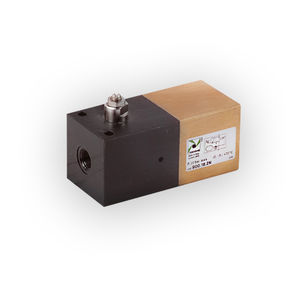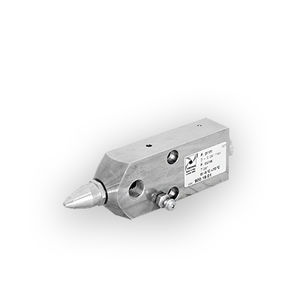
- Hydraulics - Pneumatics
- Valve
- PNEUMAX
- Company
- Products
- Catalogs
- News & Trends
- Exhibitions
Pneumatic transducer 900 series
Add to favorites
Compare this product
Description
• Pressure switch, which transforms a pneumatic signal into an electric one.
• impulse generator, which transforms a permanent pneumatic signal into an adjustable impulse from 0 to 10 seconds.
• Pneumatic timer (n.C. or n.O.), which cuts or releases a pneumatic signal within an adjustable time.
• Two hands safety valve, which allows a safety use of two hands pneumatic controls (for example two push-button 3/2 N.C. to a certain distance) excluding false signals in case of push-button or valve malfunction.
• Flip – Flop: 5/2 ways valve, single signal actuated, commutes the outlet from 2 to 4 and vice versa at each puls.
• For a correct functioning it’s important that inlet pressure be the same or lower than pilot pressure.
• Oscillator valve, 5/2 – G 1/8″ with two logic functions “NOT” mounted on board, switches when the pressure in the connected cylinder exhaust chamber is reaching the threshold of “NOT”.
• Signal amplifier, 3/2 – G 1/8″ N.C. valve actuated by weak signals but higher than 0.05 bar.
• Progressive start-up valve, which is a device that is fitted in between valve or solenoid valve and cylinder allows a gradual filling of the chamber providing a low power cylinder movement. The progressive start-up valve is made of a flow control valve and a 2/2 N.C. valve with 6 mm nominal orifice. the valve is totally open when the pressure in the cylinder reaches 50% of inlet pressure.
Catalogs
GENERAL CATALOGUE 2021
1106 Pages
Related Searches
- PNEUMAX valve
- Hand valve
- Control valve
- Stainless steel valve
- Water valve
- PNEUMAX pneumatic valve
- Threaded valve
- PNEUMAX solenoid valve
- Valve with flange
- Stop valve
- Flap valve
- Non-return valve
- Electric valve
- PNEUMAX gas solenoid valve
- ISO valve
- PNEUMAX directional control valve
- PNEUMAX NC solenoid valve
- 2-way solenoid valve
- Pneumatically-operated valve
- PNEUMAX pressure regulator
*Prices are pre-tax. They exclude delivery charges and customs duties and do not include additional charges for installation or activation options. Prices are indicative only and may vary by country, with changes to the cost of raw materials and exchange rates.






